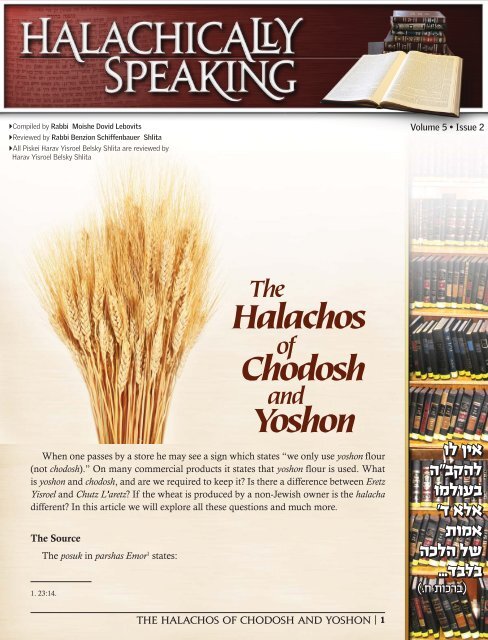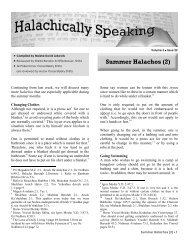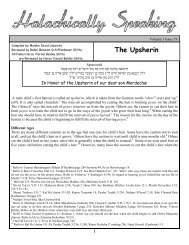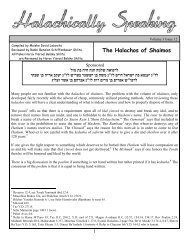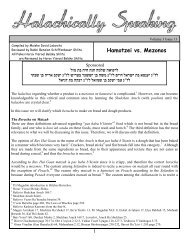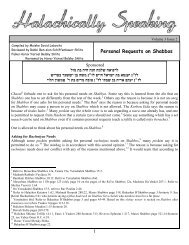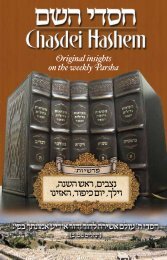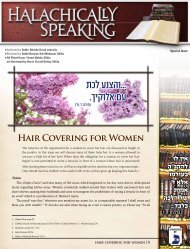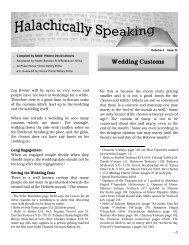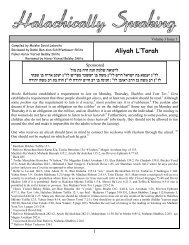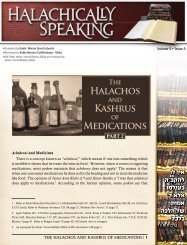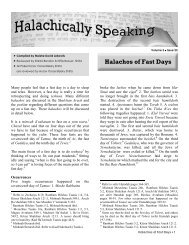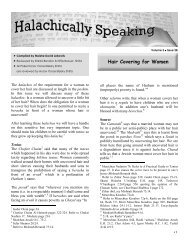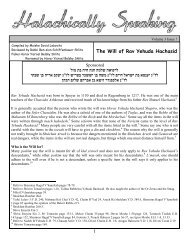You also want an ePaper? Increase the reach of your titles
YUMPU automatically turns print PDFs into web optimized ePapers that Google loves.
Compiled by Rabbi Moishe Dovid Lebovits<br />
Reviewed by Rabbi Benzion Schiffenbauer Shlita<br />
All Piskei Harav Yisroel Belsky Shlita are reviewed by<br />
Harav Yisroel Belsky Shlita<br />
Volume 5 • Issue 2<br />
When one passes by a store he may see a sign which states “we only use yoshon flour<br />
(not chodosh).” On many commercial products it states that yoshon flour is used. What<br />
is yoshon <strong>and</strong> chodosh, <strong>and</strong> are we required to keep it? Is there a difference between Eretz<br />
Yisroel <strong>and</strong> Chutz L’aretz? If the wheat is produced by a non-Jewish owner is the halacha<br />
different? In this article we will explore all these questions <strong>and</strong> much more.<br />
<strong>The</strong> Source<br />
<strong>The</strong> posuk in parshas Emor 1 states:<br />
1. 23:14.<br />
<strong>The</strong><br />
<strong>Halachos</strong><br />
<strong>of</strong><br />
<strong>Chodosh</strong><br />
<strong>and</strong><br />
<strong>Yoshon</strong><br />
אין לו להקב"ה<br />
בעולמו<br />
ד' אלא<br />
אמות<br />
של הלכה בלבד...<br />
ח.) (ברכות<br />
<strong>The</strong> <strong>Halachos</strong> <strong>of</strong> <strong>Chodosh</strong> <strong>and</strong> <strong>Yoshon</strong> | 1
ולחם וקלי וכרמל לא תאכלו עד עצם היום הזה עד הביאכם את קרבן אלקיכם חקת עולם<br />
לדרתיכם בכל משבתיכם.<br />
“You should not eat bread or dried kernels or granolas until this very day, until you bring the<br />
<strong>of</strong>fering <strong>of</strong> your G-D: it is an eternal decree for you generations in all dwelling places.”<br />
This posuk teaches us that when the korbon omer was brought all grain that had taken<br />
root prior to that time was permitted to be consumed. This grain is known as yoshon.<br />
Grain which took root after the korbon was brought had to wait until the next years<br />
korbon was brought. 2 This grain is commonly known as chodosh. In the times <strong>of</strong> the Bais<br />
Hamikdosh the korbon ha’omer was brought on the sixteenth day <strong>of</strong> Nissan which is the<br />
second day <strong>of</strong> Pesach. Today, when there is no Bais Hamikdosh, the day on which the<br />
korbon would have been brought permits one to eat the grain which took root before the<br />
second day <strong>of</strong> Pesach. <strong>The</strong> consensus <strong>of</strong> the poskim is that one must wait until the night<br />
after the sixteenth day to eat the grain. 3 In Chutz L’aretz the grain is permitted on the<br />
eighteenth night which is the first day <strong>of</strong> chol hamoed. 4<br />
Reason<br />
<strong>The</strong> Chinuch 5 explains the reason for this din is as follows: “the main sustenance<br />
<strong>of</strong> the world is from grain; therefore, it is proper to bring a korbon from the grain<br />
before one has personal enjoyment from it. This is similar to what is mentioned in the<br />
Gemorah 6 that whoever has enjoyment from this world without reciting a beracha is mo’el<br />
[behekdesh].”<br />
Men <strong>and</strong> Women<br />
This halacha applies equally to both men <strong>and</strong> women alike. 7<br />
D’oraisa or D’rabanan – Today<br />
Even though there is no bais hamikdosh today, the mitzvah <strong>of</strong> eating only yoshon is a<br />
mitzvah d’oraisa according to most poskim. 8 In the accompanying paragraphs we will<br />
השונה כל<br />
הלכות<br />
יום בכל<br />
מובטח<br />
שהוא לו<br />
עולם בן<br />
הבא...<br />
עג.) (נדה<br />
2. Refer to Mesechtas Menochos 68a, Rashi “hutar,” Shulchan Aruch Y.D. 293:3, Mishnah Berurah O.C. 489:44,<br />
Aruch Ha’shulchan Y.D. 293:7.<br />
3. Shulchan Aruch O.C. 489:10, Y.D. 293:1, Kaf Ha’chaim O.C. 489:117.<br />
4. Refer to Rambam Hilchos Machalas Asuros 10:2, Chinuch mitzvah 303, Shulchan Aruch O.C. 489:10, Y.D. 293:1,<br />
Levush Y.D. 293:1, Shulchan Aruch Harav O.C. 489:29, Chochmas Adom 131:12, Kitzur Shulchan Aruch 172:1.<br />
A person who lives in Chutz L’aretz who goes to Eretz Yisroel may wait until the seventeenth <strong>of</strong> the month (Be’er<br />
Moshe 7:page 245). <strong>The</strong>re is an uncertainty if this time goes according to the time in Yerushalayim or in other l<strong>and</strong>s<br />
(Refer to Halichos Shlomo Moadim Pesach pages 39-40:11:footnote 14).<br />
5. Mitzvah 303.<br />
6. Mesechtas Berochos 35a.<br />
7. Chinuch mitzvah 303.<br />
8. Refer to Rambam Machalos Asuros 10:2, Tosfas Mesechtas Menochos ibid “v’hu,” See Mishnah L’melech Hilchos<br />
Machalos Asuros 10:11 who says it is d’rabanan in Eretz Yisroel.<br />
2 | HAlAchicAllY SpeAKiNg
discuss the issur <strong>of</strong> chodosh <strong>and</strong> how it applies to Chutz L’aretz.<br />
According to all opinions the issur <strong>of</strong> chodosh applies in Chutz L’aretz, 9 but there is a<br />
big discussion in the poskim if the obligation to keep chodosh in Chutz L’aretz is d’rabanan<br />
or d’oraisa in nature.<br />
<strong>The</strong> Mishnah in Mesechtas Orlah 10 says that chodosh is forbidden d’oraisa. <strong>The</strong> Mishnah 11<br />
does not bring any dispute <strong>and</strong> does not distinguish between Chutz L’aretz <strong>and</strong> Eretz<br />
Yisroel. <strong>The</strong> Gemorah 12 maintains that the opinion brought in the Mishnah in Kiddushin is<br />
coming to say that chodosh is forbidden m’d’oraisa in Chutz L’aretz, since the posuk which<br />
states “in all <strong>of</strong> your dwellings places” is referring even to Chutz L’aretz.<br />
Based on this Gemorah, many poskim maintain that the issur <strong>of</strong> chodosh in Chutz L’aretz<br />
is d’oraisa. 13 Nonetheless, there are many poskim who hold that the issur <strong>of</strong> chodosh in<br />
Chutz L’aretz is only d’rabanan in nature. 14<br />
Some say the issur was only made for l<strong>and</strong>s which are in close proximity to Eretz<br />
Yisroel. 15 This would exclude l<strong>and</strong>s which are a distance from Eretz Yisroel, such as<br />
America. However, others dispute this opinion. 16<br />
Owned by a Goy<br />
<strong>The</strong>re is a big discussion in the poskim if the halachos <strong>of</strong> chodosh apply to a field that is<br />
owned by a non-Jew. 17 <strong>The</strong>re is no mention if the issur <strong>of</strong> chodosh applies to a field <strong>of</strong> a<br />
non-Jew in the writings <strong>of</strong> the Rif or Rambam. However, many say that the issur applies<br />
to a field <strong>of</strong> a non-Jew as well. 18 On the other h<strong>and</strong> the Bach 19 <strong>and</strong> may other poskim<br />
9. Mesechtas Kiddushin 37a, Tur Y.D. 293, Shulchan Aruch Y.D. 293:2, Levush 2.<br />
10. 3:9.<br />
11. Mesechtas Kiddushin 36b-37a.<br />
12. 37a. See Mesechtas Menochos 62b.<br />
13. Refer to Rosh Mesechtas Kiddushin 1:62, Rambam Hilchos Machalos Asuros 10:1, Mieri Kiddushin 37b,<br />
Shulchan Aruch O.C. 489:10, Y.D. 293:2, Gr’a 293:2, Shagas Aryeh Chadashas 2, Shulchan Aruch Harav O.C.<br />
489:29, Chochmas Adom Sharei Tzedek 7:2, Kitzur Shulchan Aruch 172:2, Mishnah Berurah O.C. 489:45, Biur<br />
Halacha “af.”<br />
14. Refer to Ohr Zerua 328, Magen Avraham O.C 489:17, Be’er Heitiv 24, Pnei Yehoshua (kuntres achron) Kiddushin,<br />
Shem Chodesh (back <strong>of</strong> Magen Ha’elef in depth), Aruch Ha’shulchan Y.D. 293:5, 619, 28 (end), Avnei Nezer Y.D.<br />
386, Chelkes Yoav Y.D. 33, Sdei Chemed mareches chodosh pages 100-104, see Biur Halacha O.C. 489 “af.’’<br />
15. Magen Avraham O.C. 489:17, Chok Yaakov 23, Shulchan Aruch Harav 30, Sdei Chemed mareches chodosh page<br />
107:3, Mishnah Berurah 45, Biur Halacha ibid, Aruch Ha’shulchan Y.D. 293:20. See Rosh Klal 2:1, Shagas Aryeh<br />
Chadashas 1 “v’yeish.”<br />
16. Opinion <strong>of</strong> Horav Yisroel Belsky Shlita.<br />
17. Refer to Kovetz Bais Aron V’Yisroel 58:pages 5-115 in depth.<br />
18. Tosfas Mesechtas Kiddushin 36b “kol,” Tur Y.D. 293, Shulchan Aruch Y.D. 493:2, Levush 1, Taz 2, Shach 6,<br />
Birchei Yosef 1, Shulchan Aruch Harav O.C. 489:30, Aruch Ha’shulchan 12, 18, Bach (teshuvos hachadasha)<br />
48-49, Orchos Rabbeinu 4:page 30:70, Teshuvos V’hanhugos 1:655, see Shagas Aryeh (hachadasha) 3:pages 27-32<br />
in great depth.<br />
19. Y.D. 293, Bach (teshuvos hachadashas) 42. <strong>The</strong>re does not seem to be a difference according to the Bach between<br />
Eretz Yisroel <strong>and</strong> Chutz L’aretz. (Refer to Sdei Chemed mareches chodosh 13:page 104, Minhag Avoseinu B’yudeinu<br />
אין לו להקב"ה<br />
בעולמו<br />
ד' אלא<br />
אמות<br />
של הלכה בלבד...<br />
ח.) (ברכות<br />
<strong>The</strong> <strong>Halachos</strong> <strong>of</strong> <strong>Chodosh</strong> <strong>and</strong> <strong>Yoshon</strong> | 3
hold that this issur does not apply to a field owned by a non-Jew. 20<br />
Those who are lenient<br />
<strong>The</strong>re are many poskim who were lenient over the years with regards to eating chodosh. 21<br />
<strong>The</strong> Bach 22 is <strong>of</strong> the opinion that “it was the custom in his country to be lenient with<br />
regards to chodosh, <strong>and</strong> that the Gedolei Yisroel who preceded him drank whiskey made<br />
from chodosh. In addition, no Gadol should teach that it is forbidden. One who wishes<br />
to be strict should be strict for himself, <strong>and</strong> only one who is very pious may practice<br />
this prohibition as well.” Others were also lenient with this halacha, to name a few,<br />
the Ba’al Shem Tov, 23 the Shulchan Aruch Harav, 24 Chozeh from Lublin, 25 <strong>and</strong> the Tzanza<br />
Rebbe. 26 <strong>The</strong> opinion <strong>of</strong> the Rama is that most <strong>of</strong> the world is not careful with this, 27 <strong>and</strong><br />
only those who are perushim are careful with it. 28 Most Chassidim have the custom to be<br />
lenient with the halachos <strong>of</strong> keeping chodosh, 29 especially in America where many say it<br />
is a d’rabbanan <strong>and</strong> does not apply to a non-Jew’s field.<br />
Pressing Situation<br />
<strong>The</strong> Aruch Ha’shulchan 30 states in the name <strong>of</strong> the Ohr Zerua 31 that even if chodosh<br />
השונה כל<br />
הלכות<br />
יום בכל<br />
מובטח<br />
שהוא לו<br />
עולם בן<br />
הבא...<br />
עג.) (נדה<br />
2:page 512).<br />
20. Be’er Hagolah Y.D. 293, Pnei Yehoshua (kuntres achron) kiddushin pages 164-165 in depth, Shem <strong>Chodosh</strong><br />
(back <strong>of</strong> Magen Ha’elef) in depth, Knesses Yecheskel 41, Shev Yaakov 61:pages 100-105b, Chelkes Yoav Y.D.<br />
33, Chidushei Harim Y.D. 19, Avnei Nezer ibid, Kitzur Shulchan Aruch 172:3, Sdei Chemed mareches chodosh<br />
13:page 104 in depth.<br />
21. Refer to Sdei Chemed mareches chodosh pages 100-119 in great depth.<br />
22. Y.D. 293. Some say that the pesak <strong>of</strong> the Bach took many people out <strong>of</strong> gehonim who did not keep the halachos <strong>of</strong><br />
chodosh during their lifetime (Refer to Natei Gavriel Pesach 3:page 89). Some say after 120 years they will ask you<br />
in shomayim why you ate chodosh <strong>and</strong> you will be able to answer that the Bach held it was permitted, but when they<br />
ask you why you spoke loshon hara if the Bach did not permit it (Orchos Rabbeinu 4:page 30:70).<br />
23. Minhag Avoseinu B’yudeinu 2:page 512, Teshuvos V’hanhugos 1:655. Some say this was only in his time when it<br />
was hard to keep chodosh (Teshuvos V’hanhugos ibid).<br />
24. O.C. 489:30, see Teshuvos (Shulchan Aruch Harav printed at the end <strong>of</strong> Shulchan Aruch Harav) 6:page 4 (new),<br />
Tzemach Tzedek Y.D. 218. Refer to Minhag Avoseinu B’yudeinu 2:pages 516-518.<br />
25. Avnei Nezer C.M. 115 (end).<br />
26. Nemukei Orach Chaim Y.D. 293, Darchei Chaim V’sholom 873 who quotes the Darchei Teshuva who heard it<br />
straight from the Tzanza Rebbe zt”l, Shearim Metzuyanim B’halacha 172:2, Bais Avi 4:138:15. Refer to Minhag<br />
Avoseinu B’yudeinu pages 522-523 for those who kept chodosh., see Bais Avi 4:138:2. Refer to Orchos Rabbeinu<br />
3:page 30:70 who quotes both the Steipler zt”l <strong>and</strong> the Chazzon Ish zt”l were very careful with keeping the<br />
halachos <strong>of</strong> chodosh. Horav Yisroel Belsky Shlita is adherent to the halachos <strong>of</strong> chodosh.<br />
27. Refer to Taz Y.D. 293:4 (top), Be’er Hagolah Y.D. 293, Sdei Chemed mareches chodosh 13:page 104, page 119,<br />
Aruch Ha’shulchan Y.D. 293:6, 28, Minchas Yitzchok 8:115, Journal <strong>of</strong> Halacha <strong>and</strong> Contemporary Society<br />
pages 54-71 in great depth.<br />
28. 132 (teshuvos). Refer to Journal <strong>of</strong> Halacha <strong>and</strong> Contemporary Society 3:page 57.<br />
29. Refer to Tzitz Eliezer 20:40:1, Natei Gavriel Pesach 3:pages 87-89, Teshuvos V’hanhugos 1:655, Kovetz Bais Aron<br />
V’Yisroel 58:pages 11-12.<br />
30. O.C. 489:6, see Biur Halacha O.C. 489 “af.”<br />
31. 328.<br />
4 | HAlAchicAllY SpeAKiNg
is forbidden d’oraisa in Chutz L’aretz, when it is a pressing situation 32 one can rely on<br />
those who hold that the issur <strong>of</strong> chodosh is only d’rabanan. <strong>The</strong>refore, in a situation<br />
where one is not sure if a specific grain is chodosh one may rely on the lenient opinion<br />
<strong>and</strong> eat it. 33<br />
<strong>The</strong> Rama 34 says that all grain is permitted even if it may be chodosh, based on a sfek<br />
sfeka – a double doubt. 35 Maybe the grain is from last year, <strong>and</strong> if it is in fact from this<br />
year, maybe it took root before Pesach. If one knows for sure that the grain is new grain<br />
(rooted after Pesach) then one should be stringent. In this case one should not tell people<br />
that it is chodosh. Since it is very hard for some people to adhere to halacha, they will be<br />
doing the issur knowingly <strong>and</strong> it is better to do it unknowingly. 36<br />
Today, it is very easy to know which grain is new grain <strong>and</strong> which grain is old grain.<br />
In addition, today it is very easy to get yoshon grain, <strong>and</strong> it can not be considered a<br />
pressing situation in the United States. <strong>The</strong>refore relying on these leniencies today is<br />
questionable. 37<br />
<strong>The</strong> Gr’a <strong>and</strong> Mishnah Berurah’s View<br />
<strong>The</strong> Gr’a 38 strongly disagrees with the opinion which maintains that chodosh does not<br />
apply to the field <strong>of</strong> a non-Jew. He says, “His words are simply a total error <strong>and</strong> not<br />
even worthy <strong>of</strong> comment; he would have been wiser to remain silent.” <strong>The</strong> Mishnah<br />
Berurah 39 says the following on those who are lenient (a loose translation). “Most <strong>of</strong> the<br />
world is not careful with the halachos <strong>of</strong> chodosh. <strong>The</strong> reason for the leniency is based on<br />
the fact that it is hard to keep, <strong>and</strong> they rely on the opinions that hold in Chutz L’aretz<br />
the issur <strong>of</strong> chodosh is d’rabanan. In addition, they rely on the fact that the grain owned<br />
by a non-Jew is not subject to the halachos <strong>of</strong> chodosh. One can not rebuke those who are<br />
lenient, but one who is more scrupulous in his mitzvah observance should not rely on<br />
the lenient opinions but should be stringent as much as possible, since many say that the<br />
issur <strong>of</strong> chodosh is d’oraisa even in Chutz L’aretz.” 40<br />
32. Taz Y.D. 293:4.<br />
33. Refer to Biur Halacha ibid.<br />
34. Y.D. 293:3. Refer to Aruch Ha’shulchan 16, Mesora 20:pages 82-84, Mivashei Torah 19:pages 121-123. Refer to<br />
Bais Avi 4:138. <strong>The</strong> Igros Moshe Y.D. 4:46 (end) agrees with the Rama, but says one should find out about which<br />
grain is yoshon even if it may be bothersome.<br />
35. For a discussion on why the crops are not considered a daver sh’yeish lo matirim” <strong>and</strong> are not botel at all see Shach<br />
Y.D. 110:56, Taz Y.D. 293:1, Be’er Heitiv Y.D. 293:4, Sdei Chemed ibid:pages 113-118, Bais Avi ibid.<br />
36. Others say this was talking in Pol<strong>and</strong> (Bais Avi 4:138), but in Russia it would not apply since before Pesach is not<br />
the growing time for grain (Aruch Ha’shulchan Y.D. 293:18. see Mishnah Berurah 489:45).<br />
37. Opinion <strong>of</strong> Harav Yisroel Belsky Shlita quoted in Halacha Berurah page 155:footnote 35.<br />
38. Y.D. 293:2.<br />
39. O.C. 489:45. Refer to Dugmas M’darchei Avi page 21 who says that the Ch<strong>of</strong>etz Chaim zt”l was very careful to keep<br />
the halachos <strong>of</strong> chodosh.<br />
40. Refer to Biur Halacha O.C. 489 “af.”<br />
אין לו להקב"ה<br />
בעולמו<br />
ד' אלא<br />
אמות<br />
של הלכה בלבד...<br />
ח.) (ברכות<br />
<strong>The</strong> <strong>Halachos</strong> <strong>of</strong> <strong>Chodosh</strong> <strong>and</strong> <strong>Yoshon</strong> | 5
Those who keep <strong>Chodosh</strong><br />
L’maseh, today many people keep these halachos, <strong>and</strong> one who does so should have<br />
beracha brought upon him. 41 We will discuss the halachos that apply to this mitzvah.<br />
Which Grains<br />
Only five grains have a concern <strong>of</strong> chodosh. 42 <strong>The</strong>se are wheat, barley, oats, rye, <strong>and</strong><br />
spelt. 43 Buckwheat, rice, corn, millet, <strong>and</strong> soybeans never have a chodosh concern.<br />
Enjoyment from <strong>Chodosh</strong><br />
One is not allowed to have enjoyment by eating chodosh, but one is able to have other<br />
enjoyment from it, such as doing business with it. 44<br />
Taking Root – Hashrasha<br />
<strong>The</strong> issur <strong>of</strong> chodosh only applies to a new crop. In order to know if a grain is from a<br />
new or an old crop, one has to know when the rooting <strong>of</strong> the plant took place. If it took<br />
root before the sixteenth <strong>of</strong> Nissan then it is from the old crop, <strong>and</strong> is permitted. However,<br />
if it took root on the sixteenth or later, it is considered a new crop <strong>and</strong> forbidden until<br />
the next Pesach. 45<br />
<strong>The</strong>re is a dispute as to how many days after planting does hashrasha take place. Some<br />
say three days, 46 while others say two weeks. 47 Many poskim go in accordance with the<br />
first view stated. 48 According to the this opinion, if grain was planted three days before<br />
Pesach it is considered old grain <strong>and</strong> is permitted to be eaten when the sixteenth day <strong>of</strong><br />
Nissan passes.<br />
Winter <strong>and</strong> Summer Crops<br />
<strong>The</strong>re are two kinds <strong>of</strong> crops, winter <strong>and</strong> summer. In America, winter crops are<br />
planted in the fall, remain in the ground throughout the winter months as well as<br />
through Pesach, <strong>and</strong> are harvested in the early summer. Since these crops were in the<br />
ground through Pesach, by the time that they are harvested they are always yoshon.<br />
השונה כל<br />
הלכות<br />
יום בכל<br />
מובטח<br />
שהוא לו<br />
עולם בן<br />
הבא...<br />
עג.) (נדה<br />
41. Kitzur Shulchan Aruch 172:3, See Mishnah Berurah O.C. 489:45. <strong>The</strong> Chai Adom 131:12 says anyone who loves<br />
himself should keep this mitzvah.<br />
42. Menochos 70a.<br />
43. Shulchan Aruch Y.D. 293:1, Mishnah Berurah O.C. 489:44.<br />
44. Horav Yisroel Belsky Shlita, see Darchei Teshuva 63, Teshuvos V’hanhugos 2:396, Shevet Ha’kehusi 6:285:11.<br />
Refer to Shevet Ha’Levi 2:162 who is stringent.<br />
45. Tur Y.D. 293, Shulchan Aruch Y.D. 293:3, Levush 3, Kitzur Shulchan Aruch 172:2, Aruch Ha’shulchan 7.<br />
46. Horav Yisroel Belsky Shlita, see Shach Y.D. 293:2 quoting the opinion <strong>of</strong> the Terumas Hadeshen (191), Aruch<br />
Ha’shulchan 7, Be’er Moshe 8:255:pages 250-251.<br />
47. Nekudas Hakesef Y.D. 293, see Minchas Yitchok 303:5, Birchei Yosef Y.D. 293:4.<br />
48. Aruch Ha’shulchan 9. Refer to Pischei Teshuva 4, Minchas Yitzchok 6:43. See Chasam S<strong>of</strong>er Y.D. 100 (end). Refer<br />
to Mivakshei Torah 19:pages 117-118.<br />
6 | HAlAchicAllY SpeAKiNg
Spring crops are usually planted after Pesach <strong>and</strong> are harvested towards the end <strong>of</strong> the<br />
summer. <strong>The</strong>refore, the spring crop would be chodosh until the following Pesach. 49<br />
Rye<br />
Rye is a winter crop <strong>and</strong> is yoshon, but rye bread which contains wheat flour in<br />
addition to rye could be chodosh.<br />
Spelt<br />
Spelt in America is also a winter crop <strong>and</strong> is yoshon. 50 In Canada <strong>and</strong> other countries<br />
spelt is different <strong>and</strong> one should be aware <strong>of</strong> it. 51 In the Unites States <strong>and</strong> Canada oats<br />
<strong>and</strong> barley 52 are spring crops <strong>and</strong> are chodosh until the next Pesach. 53<br />
Malt is from barley <strong>and</strong> is used in the following foods: pretzels, c<strong>and</strong>ies, cereals,<br />
vodka, <strong>and</strong> prepared cocktails. 54<br />
Wheat<br />
Wheat in America is grown as two distinct crops, winter wheat <strong>and</strong> summer wheat.<br />
Winter wheat produces low gluten flour which is used for most cookies, cereals, soups,<br />
crackers, farfel, fish sticks, blintzes, pretzels, cakes, matzos <strong>and</strong> other s<strong>of</strong>t baked products.<br />
<strong>The</strong>refore, these products are yoshon, but one has to make sure their other ingredients<br />
are not chodosh.<br />
Spring wheat produces high gluten flour which usually makes dough more chewy<br />
<strong>and</strong> enables it to be strongly held together. Spring wheat is used in breads, challahs,<br />
pizza, <strong>and</strong> pasta products like noodles, macaroni <strong>and</strong> spaghetti. <strong>The</strong>refore, these items<br />
are chodosh from the end <strong>of</strong> the summer until Pesach. 55 Obviously weather conditions<br />
can play a role in regards to when the grains are planted <strong>and</strong> harvested. 56<br />
49. <strong>The</strong> Mashgiach’s Guide to <strong>Yoshon</strong> <strong>and</strong> <strong>Chodosh</strong> page 3.<br />
50. A Guide to <strong>Chodosh</strong> (07-08) page 5.<br />
51. A Guide to <strong>Chodosh</strong> ibid.<br />
52. Which would include for example, chulent, corn flakes, <strong>and</strong> beer (Refer to Shach Y.D. 293:6, Chochmas Adom<br />
131:12, Aruch Ha’shulchan 23, Bais Avi 4:138:19 who are stringent with beer), see Bais Hillel Y.D. 293, Pnei<br />
Yehoshua (kuntres achron) Kiddusin, who are lenient, <strong>and</strong> see Orchos Rabbeinu 4:page 30:70 who quotes the<br />
Steipler zt”l as being lenient with beer, however, see Emes L’Yaakov O.C. 489:footnote 461 who says one should<br />
not be lenient with beer even if he is lenient with chodosh). Refer to Be’er Heitiv Y.D. 293:5 <strong>and</strong> Piskei Teshuvos<br />
489:footnote 133.<br />
53. A Guide to <strong>Chodosh</strong> ibid.<br />
54. A Guide to <strong>Chodosh</strong> ibid:pages 11-12. Whiskey, bourbon, <strong>and</strong> rum are aged <strong>and</strong> are likely to be yoshon (ibid:<br />
page 12). However, if the malt is placed in baking flours as a chemical agent which allows the yeast to react with<br />
the water <strong>and</strong> air in order to make the dough rise, then it is botel. In the situation that it is added as a sweetening<br />
coloring agent then it is not botel (opinion <strong>of</strong> Harav Yaakov Kamenetsky zt”l quoted in a Guide to <strong>Chodosh</strong> 07-08<br />
page 13).<br />
55. <strong>The</strong> Mashgiach’s Guide to <strong>Yoshon</strong> <strong>and</strong> <strong>Chodosh</strong> pages 4, 6-7.<br />
56. Refer to Terumas Hadeshen 191.<br />
אין לו להקב"ה<br />
בעולמו<br />
ד' אלא<br />
אמות<br />
של הלכה בלבד...<br />
ח.) (ברכות<br />
<strong>The</strong> <strong>Halachos</strong> <strong>of</strong> <strong>Chodosh</strong> <strong>and</strong> <strong>Yoshon</strong> | 7
Durum<br />
Durum is a type <strong>of</strong> wheat which is used in making pasta products <strong>and</strong> egg noodles.<br />
In the Unites States, durum wheat is usually a spring crop, <strong>and</strong> therefore poses a chodosh<br />
concern. 57<br />
<strong>Chodosh</strong> <strong>and</strong> <strong>Yoshon</strong> Mixed Together<br />
If there is mostly yoshon mixed together with a little chodosh then one can be lenient<br />
<strong>and</strong> use the yoshon flour since it is botel b’rov. 58<br />
Pesach to summer<br />
<strong>The</strong> new crop <strong>of</strong> oats is not harvested until mid July, the new crop <strong>of</strong> wheat is not<br />
harvested until early August, <strong>and</strong> the new crop for barley is not harvested until the<br />
end <strong>of</strong> August. Accordingly, from Pesach until the above times one does not have to be<br />
concerned for chodosh. 59 One has to find out what the cut<strong>of</strong>f date is in the country that<br />
he lives in. 60<br />
Storage<br />
If there is a problem <strong>of</strong> chodosh from the summer (see above) until the following<br />
Pesach, how is it possible to have yoshon cakes, breads etc? <strong>The</strong> answer is storage. Many<br />
are concerned if they store flour then worms can develop. It is advisable to store the<br />
flour in cool areas. 61 Some say today this is not a concern since the flour is centrifuged<br />
which breaks microscopic eggs. 62<br />
Israeli Products<br />
Products produced under hashgacha in Eretz Yisroel are all made with yoshon. 63 All<br />
food produced by the Badatz <strong>of</strong> Yerushalayim, even if it is produced outside <strong>of</strong> Eretz<br />
Yisroel is yoshon. 64 Some say there is no concern <strong>of</strong> yoshon with Israeli products since<br />
the planting is before Pesach <strong>and</strong> the harvesting is after Pesach. 65 Nonetheless, many<br />
products are made out <strong>of</strong> Eretz Yisroel <strong>and</strong> are shipped to Eretz Yisroel, therefore, one has<br />
to be careful before purchasing such products to make sure it is yoshon. 66<br />
השונה כל<br />
הלכות<br />
יום בכל<br />
מובטח<br />
שהוא לו<br />
עולם בן<br />
הבא...<br />
עג.) (נדה<br />
57. A Guide to <strong>Chodosh</strong> ibid:page 7 (bottom).<br />
58. Magen Avraham O.C. 489:17, Chochmas Adom 53:28, Aruch Ha’shulchan 28, Teshuvos V’hanhugos 1:656.<br />
59. A Guide to <strong>Chodosh</strong> ibid.<br />
60. Sharei Toras Habayis page 163:11. Refer to Chochmas Adom 131:12, Aruch Ha’shulchan Y.D. 293:21, Piskei<br />
Teshuvos 489:footnote 135 in regard to Australia.<br />
61. Teshuvos V’hanhugos 1:655, <strong>The</strong> Mashgiach’s Guide to <strong>Yoshon</strong> <strong>and</strong> <strong>Chodosh</strong> ibid:page 10.<br />
62. Daf Ha’kashrus available at www.oukosher..org.<br />
63. <strong>The</strong> Mashgiach’s Guide to <strong>Yoshon</strong> <strong>and</strong> <strong>Chodosh</strong> page 14, A Guide to <strong>Chodosh</strong> (07-08) page 11.<br />
64. A Guide to <strong>Chodosh</strong> (07-08) page 12.<br />
65. Natei Gavriel Pesach 3:page 90:7, Sharei Toras Habayis page 161:5.<br />
66. <strong>The</strong> Mashgiach’s Guide to <strong>Yoshon</strong> <strong>and</strong> <strong>Chodosh</strong> page 14, A Guide to <strong>Chodosh</strong> (07-08) page 11, Natei Gavriel<br />
8 | HAlAchicAllY SpeAKiNg
Kashering Keilim<br />
<strong>The</strong> Magen Avraham 67 says that individuals who are careful to only eat yoshon may eat<br />
yoshon produced on equipment that was used for products that may have been chodosh<br />
without kashering even if the equipment is ben yomo if the yoshon <strong>and</strong> possibly chodosh<br />
items are min b'mino. If however, the items are min b'sheaino mino or if the equipment<br />
was used for items that are surely chodosh then the equipment may not be used until it<br />
is aino ben yomo, but no kashering is required. 68 This opinion <strong>of</strong> the Magen Avraham is<br />
based on the assumption that eating chodosh in Chutz L’aretz is only an issur d’rabannan.<br />
However, the Sha’agas Aryeh 69 argues that chodosh is assur mid’oraisa even in Chutz L’aretz<br />
<strong>and</strong> therefore he holds 70 that the st<strong>and</strong>ard rules <strong>of</strong> ta’am k’ikar apply. Accordingly,<br />
equipment used for possibly-chodosh products must be kashered before yoshon products<br />
are produced. 71 <strong>The</strong> Mishnah Berurah 72 holds even if one knows that the equipment<br />
was used for chodosh one only needs to wait twenty four hours before using the utensil<br />
without kashering. 73<br />
Kashrus Organizations<br />
<strong>The</strong> major kashrus organizations in the Unites States do not require that the products<br />
they certify be made with yoshon. 74<br />
<strong>Chodosh</strong> from Chutz L’aretz to Eretz Yisroel <strong>and</strong> Vice Versa<br />
<strong>The</strong>re are those who maintain if chodosh was grown in Chutz L’aretz it is ossur when<br />
brought to Eretz Yisroel <strong>and</strong> made into bread etc, 75 while others argue. 76 If chodosh grain<br />
was made in Eretz Yisroel <strong>and</strong> shipped to Chutz L’aretz it is still forbidden. 77<br />
Giving to Children<br />
Some poskim are lenient with regards to giving chodosh products to a child. 78<br />
ibid:footnote 11.<br />
67. O.C. 489:17.<br />
68. See Sha’ar Ha’tzyion 489:58. Refer to Rama (teshuvos) 132:15.<br />
69. Sha’agas Aryeh Chadashos dinei chodosh Chapters 1-2.<br />
70. Ibid. Chapter 13.<br />
71. Refer to OU document Z-48.<br />
72. Mishnah Berurah 489:48, Sha'ar Ha’tzyion 489:57, Kaf Ha’chaim O.C. 489:113.<br />
73. This is the policy <strong>of</strong> the KOF-K. Refer to OU document Z-48. Refer to OU documents Z-50, <strong>and</strong> Z-52 in regard<br />
to milling yoshon flour on chodosh equipment.<br />
74. <strong>The</strong> Laws <strong>of</strong> Pesach a Digest 2006 page 685.<br />
75. Achi Ezer Y.D. 2:39, Tzitz Eliezer 20:40:2, see Har Tzvi O.C. 2:70.<br />
76. Har Tzvi 2:70.<br />
77. Refer to Achi Ezer Y.D. 2:39 in great depth.<br />
78. Hechsheiros K’halacha page 503. Refer to Rivevos Ephraim 8:599:page 472 who disagrees but does not make<br />
mention if it is talking about children. It could be he is referring to actually feeding chodosh to someone as opposed<br />
אין לו להקב"ה<br />
בעולמו<br />
ד' אלא<br />
אמות<br />
של הלכה בלבד...<br />
ח.) (ברכות<br />
<strong>The</strong> <strong>Halachos</strong> <strong>of</strong> <strong>Chodosh</strong> <strong>and</strong> <strong>Yoshon</strong> | 9
Medicines<br />
One does not have to be concerned about the halachos <strong>of</strong> chodosh when taking<br />
medications. 79<br />
Matzah<br />
Even one who is lenient with the halachos <strong>of</strong> chodosh should only use matzah for<br />
Pesach from yoshon flour. 80<br />
Shehechiyanu<br />
No shehechiyanu is recited on new grain since it is hard to tell the difference between<br />
new grain <strong>and</strong> old grain. 81<br />
Havdala from <strong>Chodosh</strong> Beer<br />
One who holds <strong>of</strong> chodosh only as a chumra may hear havdala from someone making<br />
it over chodosh beer. 82<br />
Muktzah<br />
Some say that chodosh prior to Pesach is forbidden to be moved since it is muktzah. 83<br />
Child Wishes to Keep This Mitzvah<br />
If a child wants to accept this mitzvah upon himself <strong>and</strong> his father<br />
does not want him to, he does not have to listen to his father. 84<br />
After word<br />
As mentioned above, many poskim were lenient <strong>and</strong> ate chodosh<br />
products. On the other h<strong>and</strong> many were stringent <strong>and</strong> only ate<br />
yoshon. Those who eat chodosh should not be rebuked since they<br />
have on whom to rely upon. Today, one is able to keep yoshon much<br />
more easily. 85 If one wants to start keeping chodosh then he should<br />
say bli neder beforeh<strong>and</strong>, since he may not be able to keep it. 86<br />
Thanks are due<br />
to Rabbi Yosef<br />
Herman Shlita<br />
(Monsey N.Y.) who<br />
has devoted the last<br />
thirty-five years to<br />
making sure we have<br />
yoshon. A guide to the<br />
halachos <strong>of</strong> chodosh is<br />
available by calling<br />
1-718-305-5133.<br />
השונה כל<br />
הלכות<br />
יום בכל<br />
מובטח<br />
שהוא לו<br />
עולם בן<br />
הבא...<br />
עג.) (נדה<br />
to letting them eat it on their own.<br />
79. Sefer Hechsheiros 21:59.<br />
80. Da’as Torah O.C. 453:4, Sdei Chemed Chometz U’matzah 10:16:page 434. Refer to Shulchan Aruch Harav<br />
teshuvos ibid who is lenient.<br />
81. Magen Avraham O.C. 225:14, Mishnah Berurah 18.<br />
82. Refer to Biur Halacha O.C 296 “im hu.” See Shemiras Shabbos K’hilchoso 2:47:footnote 88.<br />
83. Halichos Shlomo Moadim Pesach 2:footnote 14:pages 39-40. See Shalmei Yehuda 8:16:footnote<br />
39.<br />
84. Tzitz Eliezer 20:40:2.<br />
85. Refer to Igros Moshe Y.D. 4:46 (end).<br />
86. Sharei Toras Habayis page 164:15.<br />
10 | HAlAchicAllY SpeAKiNg
SPONSORED:<br />
לרפואה שלמה<br />
מרת רחל בת פעסיל<br />
SPONSORED:<br />
לזכר נשמת<br />
מרת יענטא בת ישראל חיים ע״ה<br />
הרב משה בן יששכר בעריש ע״ה<br />
הרב יעקב אריה בן שבתי ע״ה<br />
HALACHICALLY SPEAKING<br />
Halachically Speaking is a biweekly<br />
publication compiled by Rabbi<br />
Moishe Dovid Lebovits, a former<br />
chaver kollel <strong>of</strong> Yeshiva Torah Vodaath<br />
<strong>and</strong> a musmach <strong>of</strong> Harav Yisroel Belsky<br />
Shlita. Rabbi Lebovits currently works<br />
as the Rabbinical Administrator for<br />
the KOF-K Kosher Supervision.<br />
Each issue reviews a different area<br />
<strong>of</strong> contemporary halacha with an<br />
emphasis on practical applications <strong>of</strong><br />
the principles discussed. Significant<br />
time is spent ensuring the inclusion<br />
<strong>of</strong> all relevant shittos on each topic, as<br />
well as the psak <strong>of</strong> Harav Yisroel Belsky,<br />
shlita on current issues.<br />
IN THE NEXT ISSUE:<br />
<strong>The</strong> <strong>Halachos</strong> <strong>of</strong> Medications Part 1<br />
•Beracha on Medications<br />
•Taking Medications on Shabbos<br />
•Taking Pills on a Fast Day <strong>and</strong> much much more.....<br />
SPONSORSHIP OPPORTUNITIES<br />
Halachically Speaking is distributed<br />
to over 40 shuls in Brooklyn. It is sent<br />
via email to subscribers across the<br />
country, can be seen in the Friday<br />
edition <strong>of</strong> the Hamodia, <strong>and</strong> read<br />
daily by tens <strong>of</strong> thous<strong>and</strong>s <strong>of</strong> people<br />
on www.theyeshivaworld.com.<br />
SPONSORED BY:<br />
SUBSCRIBE<br />
FOR FREE<br />
by visiting<br />
www.thehalacha.com<br />
<strong>and</strong> filling out the subscription form<br />
KOF-K Kosher Supervision<br />
To sponsor an issue please call<br />
718-744-4360<br />
© Copyright 2009<br />
by Halachically Speaking
Compiled by Rabbi Moishe Dovid Lebovits Volume 1 Issue 8<br />
Waiting after Eating Hard Cheese<br />
before eating Meat<br />
According to the opinion <strong>of</strong> many poskim, one is<br />
required to wait six hours after consuming hard<br />
cheeses which are aged six months or more<br />
before eating meat. If the cheese is melted <strong>and</strong><br />
not recognizable, then one would not have to<br />
wait six hours (Harav Yisroel Belsky Shlita).<br />
An example <strong>of</strong> cheese requiring a six hour wait<br />
is parmesan cheese.<br />
Consult with your Rav to determine how long<br />
you should wait after eating a particular type <strong>of</strong><br />
cheese.<br />
A detailed discussion on this topic will iy”h<br />
appear in the next couple <strong>of</strong> months.<br />
Cleaning Strawberries<br />
Cut <strong>of</strong>f the leafy part <strong>of</strong> the strawberry,<br />
fill a bowl with vegetable washing soap<br />
<strong>and</strong> let the strawberries soak in the cold<br />
water solution for 3-5 minutes. (<strong>The</strong>re<br />
is enough vegetable washing soap if<br />
the water is very slippery from the<br />
soap). Be sure not to cut into the center<br />
hole <strong>of</strong> the strawberry. <strong>The</strong>n wash <strong>of</strong>f<br />
the strawberries under a strong stream<br />
<strong>of</strong> water, making sure that the water<br />
touches every part <strong>of</strong> the strawberry.<br />
After completing this process, one does<br />
not have to check the strawberry<br />
further for bugs.<br />
For articles, audio shiurim downloads, <strong>and</strong> videos please visit our website at www.k<strong>of</strong>-k.org.<br />
Topics include bishul akum, checking for bugs, tevilas keilim <strong>and</strong> many other topics.<br />
Articles <strong>and</strong> shiurim are available by our vaad halacha (Harav Aron Felder Shlita, Harav Shlomo<br />
Gissinger Shlita, <strong>and</strong> Harav Doniel Neustadt Shlita), <strong>and</strong> our Rabbinical Staff including Rabbi Ari<br />
Senter Shlita <strong>and</strong> more.<br />
Please note: the material presented here is for consumer awareness; one should maintain the time honored custom <strong>of</strong> asking one’s own Rav for<br />
personal pesak. To receive this FREE via email please e-mail mlebovits@k<strong>of</strong>-k.org.


